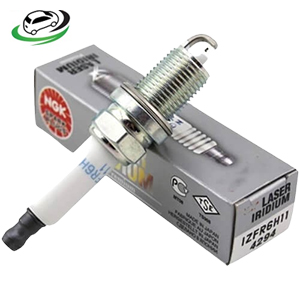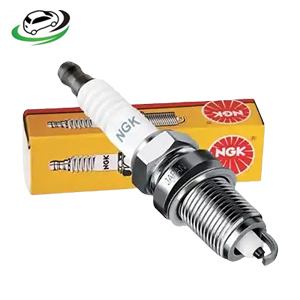Get NGK Laser Platinum Spark Plug Mitsubishi, Lexus, Honda, Toyota PZFR5F-11
A Laser Platinum Spark Plug is a type of spark plug designed for internal combustion engines, typically found in vehicles. These spark plugs are known for their high performance and longevity due to their advanced construction and materials. Here are some key features and benefits of Laser Platinum Spark Plugs:
- Platinum Tips: The use of platinum in both the center and ground electrodes reduces wear and extends the lifespan of the spark plug. Platinum is a durable material that maintains sharp edges for a longer period, ensuring consistent spark and performance.
- Fine-Wire Design: The fine-wire center electrode and a tapered ground electrode design help to produce a more focused and efficient spark. This improves ignition efficiency, leading to better fuel combustion, improved engine performance, and lower emissions.
- Longevity: Platinum spark plugs typically have a longer service life compared to standard copper spark plugs. They can last up to 60,000 to 100,000 miles, depending on the engine and driving conditions.
- Better Performance: Enhanced ignition efficiency contributes to smoother engine operation, better acceleration, and improved fuel economy. These spark plugs can also handle higher temperatures and pressures, making them suitable for high-performance and modern engines.
- Reduced Voltage Requirement: The efficient design of Laser Platinum Spark Plugs reduces the voltage required to generate a spark, which can be beneficial for the ignition system and battery, especially in colder conditions.
- Improved Durability: The use of durable materials and advanced manufacturing techniques ensures that these spark plugs are resistant to fouling, corrosion, and erosion, which can degrade performance over time.
Signs a Car Needs New Spark Plugs:
-
Engine Misfires
1.1. Rough Idling
If the engine idles roughly or shakes excessively when the car is stationary, it might be due to worn-out spark plugs that are not igniting the air-fuel mixture consistently.
1.2. Intermittent Power Loss
Experiencing occasional power loss or engine stumbling, especially during acceleration, can indicate that the spark plugs are not firing correctly.
2. Poor Fuel Economy
2.1. Increased Fuel Consumption
A noticeable decrease in fuel efficiency can be a sign that the spark plugs are not producing a strong enough spark, leading to incomplete combustion and higher fuel usage.
2.2. Frequent Refueling
If you find yourself refueling more often than usual, despite similar driving habits, it may be due to inefficient spark plugs causing the engine to consume more fuel.
3. Difficulty Starting the Engine
3.1. Hard Starts
Difficulty in starting the engine, particularly in cold weather, can indicate that the spark plugs are worn and struggling to ignite the air-fuel mixture.
3.2. Extended Cranking Time
If the engine takes longer to start or requires multiple attempts, it could be a sign that the spark plugs need replacement.
4. Engine Performance Issues
4.1. Lack of Acceleration
A decrease in acceleration performance or sluggish response when pressing the accelerator pedal can be caused by spark plugs that are no longer providing efficient ignition.
4.2. Loss of Power
General loss of engine power, especially under load (such as climbing hills or carrying heavy loads), can be attributed to spark plugs that are not firing effectively.
5. Unusual Noises
5.1. Knocking or Pinging
Unusual knocking or pinging sounds from the engine, especially during acceleration, can be a sign of faulty spark plugs causing pre-ignition or detonation.
5.2. Engine Sputtering
If the engine sputters or hesitates during operation, it may be due to inconsistent firing of the spark plugs.
6. Check Engine Light
6.1. Diagnostic Trouble Codes (DTCs)
A lit check engine light can often indicate issues with the ignition system, including spark plugs. A diagnostic scan may reveal codes related to misfires or ignition problems.
7. Visual Inspection of Spark Plugs
7.1. Electrode Wear
Removing and inspecting the spark plugs can provide clear indicators of their condition. Worn or eroded electrodes suggest that the spark plugs are past their prime and need replacement.
7.2. Carbon Deposits
Heavy carbon deposits on the spark plugs indicate incomplete combustion, which can be caused by faulty spark plugs.
7.3. Oil or Fuel Fouling
Presence of oil or unburned fuel on the spark plugs can indicate engine issues, but it also suggests that the spark plugs are not functioning properly.
8. Emission Test Failure
8.1. High Emissions
Failing an emissions test can be a result of inefficient combustion caused by worn-out spark plugs. Replacing them with Laser Platinum spark plugs can help achieve more complete combustion and reduce emissions.
9. Scheduled Maintenance
9.1. Manufacturer Recommendations
Even if no obvious symptoms are present, following the vehicle manufacturer’s recommended maintenance schedule for spark plug replacement ensures optimal engine performance and prevents future issues.
Follow us on Facebook for more parts.





